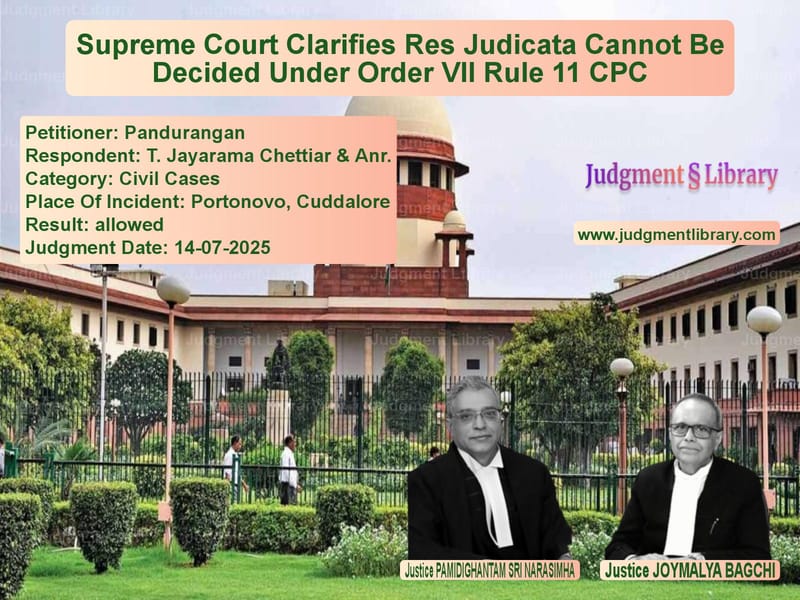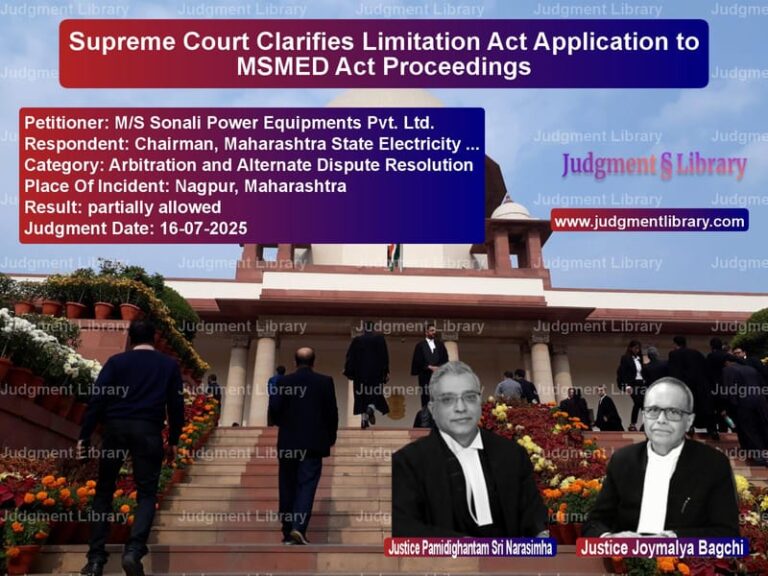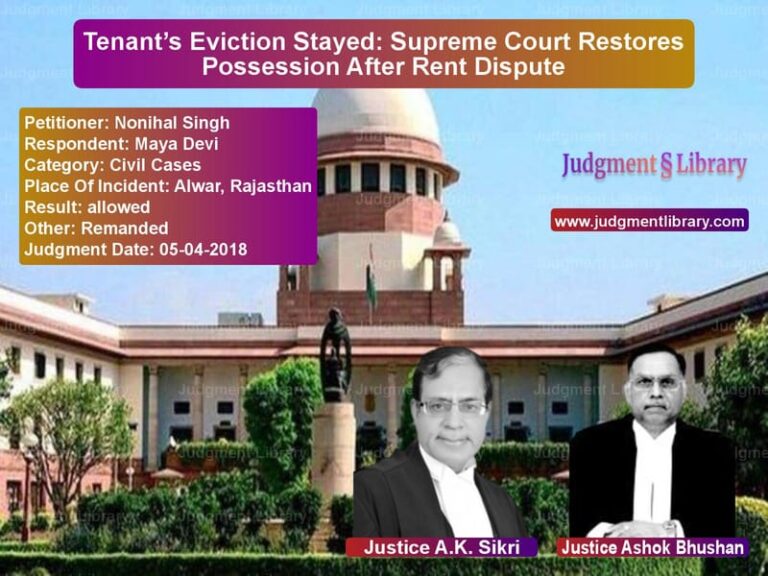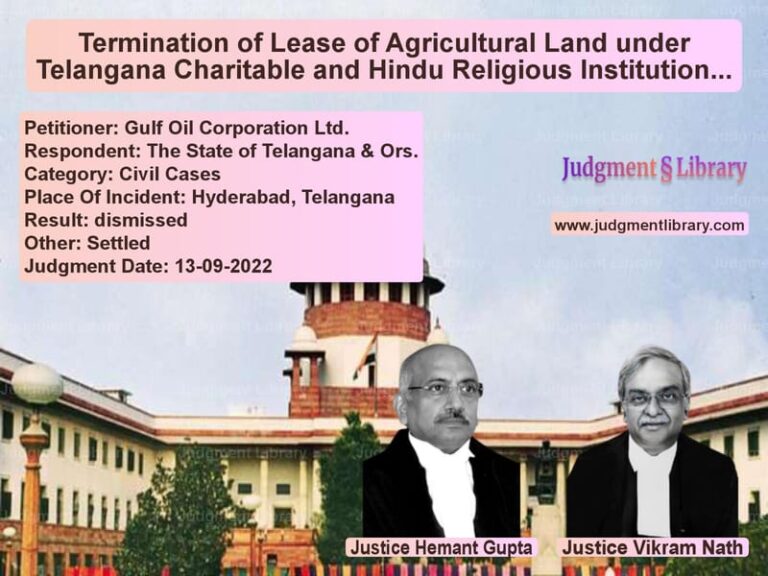Supreme Court Clarifies Res Judicata Cannot Be Decided Under Order VII Rule 11 CPC
In a significant judgment that clarifies the procedural boundaries of civil litigation, the Supreme Court has ruled that the complex legal principle of res judicata cannot be decided through a summary procedure under Order VII Rule 11 of the Civil Procedure Code. The case of Pandurangan vs T. Jayarama Chettiar & Anr. involves a property dispute where the appellant claimed he was a bona fide purchaser who discovered that his property was subject to an ex parte decree obtained through alleged fraud and collusion.
The legal battle began when Pandurangan purchased a property in 1998 from Hussain Babu, who had earlier purchased it from Jayam Ammal in 1991. The appellant claimed he was in peaceful possession of the property until he discovered that an advocate-commissioner was appointed to inspect his property. Upon investigation, he learned that the first respondent, T. Jayarama Chettiar, had filed a partition suit in 1996 against Jayam Ammal and others and had secured an ex parte decree in 1997. It was during the execution of this ex parte decree that the court appointed the advocate-commissioner.
Compelled by these circumstances, Pandurangan filed a suit for declaration of title and permanent injunction, specifically contending that the ex parte decree had been fraudulently and collusively obtained and was not binding on him. The defendant opposed the suit and filed an application under Order VII Rule 11 of CPC, arguing that the suit was barred by res judicata since the earlier ex parte decree had attained finality.
The appellant countered this argument by emphasizing that he was not a party to the earlier suit and therefore the principle of res judicata would not apply. The Trial Court allowed the defendant’s application and rejected the plaint, a decision that was upheld by the Madras High Court. This led to the appeal before the Supreme Court.
The Supreme Court, in its judgment delivered by Justice Pamidighantam Sri Narasimha, made several crucial observations about the scope of Order VII Rule 11 CPC. The court emphasized that the adjudication of res judicata requires a detailed examination that goes beyond the summary procedure contemplated under this provision.
The court relied on its earlier judgment in Srihari Hanumandas Totala v. Hemant Vithal Kamat & Ors, where it was held that: “25.4. Since an adjudication of the plea of res judicata requires consideration of the pleadings, issues, and decision in the ‘previous suit’, such a plea will be beyond the scope of Order 7 Rule 11(d), where only the statements in the plaint will have to be perused.”
The Supreme Court extensively quoted from the plaint to demonstrate the specific allegations made by the appellant. The plaint stated: “7. When plaintiff has been in peaceful possession and enjoyment of the suit property his vendors brother Rasool informed him that an advocate-commissioner is going to inspect the property. Plaintiff was naturally shocked. When further probed he informed the plaintiff that one Jayarama Chettiar had filed a suit against one Jayam Ammal wife of Rangasami Chettiar and others for partition in O.S. No.298 of 1996 on the file of the subordinate judge, Cuddalore and Jayam Ammal died immediately after suit and her daughter Selvi did not contest the suit and allowed it to go ex parte.”
The plaint further alleged fraudulent practices: “10. Plaintiff now finds that the 1st defendant has played a fraud on court in filing the suit in the sub court Cuddalore to suit his convenience when the Subordinate Judge’s Court Cuddalore has no territorial jurisdiction to entertain the plaint. There are six items in the said suit. The plaint in O.S. No.298 of 1996 reasons that item 4 was allotted to his father in the partition, items 2,3, and 5 were purchased by his father in the name of Jayam Ammal item 6 is a saw will. Items 2 to 6 are situated in Parangipettai village. So, the suit should have been instituted in the sub court Chidambaram. But to suit his convenience a property desiring one cent item situate in Naduveerapattu is included to invoke the jurisdiction of the sub court Cuddalore. This property does not belong to 1st defendant’s father. This is a clear case of fraud. So the decree passed in O.S. No.298/96 by a court has no territorial jurisdiction is wholly invalid and 1st defendant has not derived any right to the property under a decree which is void.”
The Supreme Court emphasized that issues relating to whether the ex parte decree was obtained by collusion, whether the defendant played fraud by filing a suit in a court having no jurisdiction, or whether the appellant was a bona fide purchaser needed detailed examination that could not be undertaken under Order VII Rule 11 CPC.
The court further relied on V. Rajeshwari v. T.C. Sarawanabava, where it was held that identifying similarity in causes of action should be a matter for trial where documents from the first suit are studied and analyzed. The court stated that res judicata cannot be a matter of speculation or inference.
In Keshav Sood v. Kirit Pradeep Sood, the Supreme Court had taken a strong view against the plea of res judicata being raised in applications seeking rejection of plaint and held: “5. As far as scope of Rule 11 of Order VII of CPC is concerned, the law is well settled. The Court can look into only the averments made in the plaint and at the highest, documents produced along with the plaint. The defence of a defendant and documents relied upon by him cannot be looked into while deciding such application. 6. Hence, in our view, the issue of res judicata could not have been decided on an application under Rule 11 of Order VII of CPC. The reason is that the adjudication on the issue involves consideration of the pleadings in the earlier suit, the judgment of the Trial Court and the judgment of the Appellate Courts.”
The Supreme Court found fault with the approach of the Trial Court, which had questioned the legality of the plaintiff’s action on the ground that “he did not raise any objection regarding the decree passed in O.S. No. 298/96. Therefore, this Court comes to the conclusion that the plea of fraud raised by the 1st respondent is not acceptable one.” The Supreme Court noted that there was neither consideration nor analysis of the case set up by the appellant in the plaint by the Trial Court.
While allowing the appeal, the Supreme Court clarified that it had not expressed any opinion on whether the ex parte decree would or would not operate as res judicata barring the present suit. The court held that enquiry into this question could not have been decided under Order VII Rule 11 CPC, particularly in the context of the specific averments made by the appellant in the plaint about the ex parte decree, the circumstances surrounding the said transaction, and the prayer in the suit for declaration and consequential relief.
The Supreme Court set aside the orders of the High Court and Trial Court and restored the suit to its original number before the District Munsif cum Judicial Magistrate, Portonovo. Given that the suit was filed in 2009, the court directed expeditious disposal of the case.
This judgment serves as an important precedent clarifying the procedural limitations of Order VII Rule 11 CPC. It reinforces that complex legal issues like res judicata, which require examination of previous suits, their pleadings, issues, and decisions, cannot be decided through a summary procedure that only considers the averments in the plaint. The judgment ensures that litigants with genuine claims of fraud and collusion get a proper opportunity to present their case through a full trial rather than having their suits dismissed at the threshold through technical objections.
The ruling balances the need for expeditious disposal of cases with the fundamental principle of justice that every litigant deserves a proper hearing, especially when allegations of fraud and collusion are involved. It prevents the misuse of procedural provisions to shut out legitimate claims that require detailed evidentiary examination.
Petitioner Name: Pandurangan.Respondent Name: T. Jayarama Chettiar & Anr..Judgment By: Justice PAMIDIGHANTAM SRI NARASIMHA, Justice JOYMALYA BAGCHI.Place Of Incident: Portonovo, Cuddalore.Judgment Date: 14-07-2025.Result: allowed.
Don’t miss out on the full details! Download the complete judgment in PDF format below and gain valuable insights instantly!
Download Judgment: pandurangan-vs-t.-jayarama-chettiar-supreme-court-of-india-judgment-dated-14-07-2025.pdf
Directly Download Judgment: Directly download this Judgment
See all petitions in Property Disputes
See all petitions in Contract Disputes
See all petitions in Specific Performance
See all petitions in Damages and Compensation
See all petitions in Other Cases
See all petitions in Judgment by P.S. Narasimha
See all petitions in Judgment by Joymalya Bagchi
See all petitions in allowed
See all petitions in supreme court of India judgments July 2025
See all petitions in 2025 judgments
See all posts in Civil Cases Category
See all allowed petitions in Civil Cases Category
See all Dismissed petitions in Civil Cases Category
See all partially allowed petitions in Civil Cases Category







